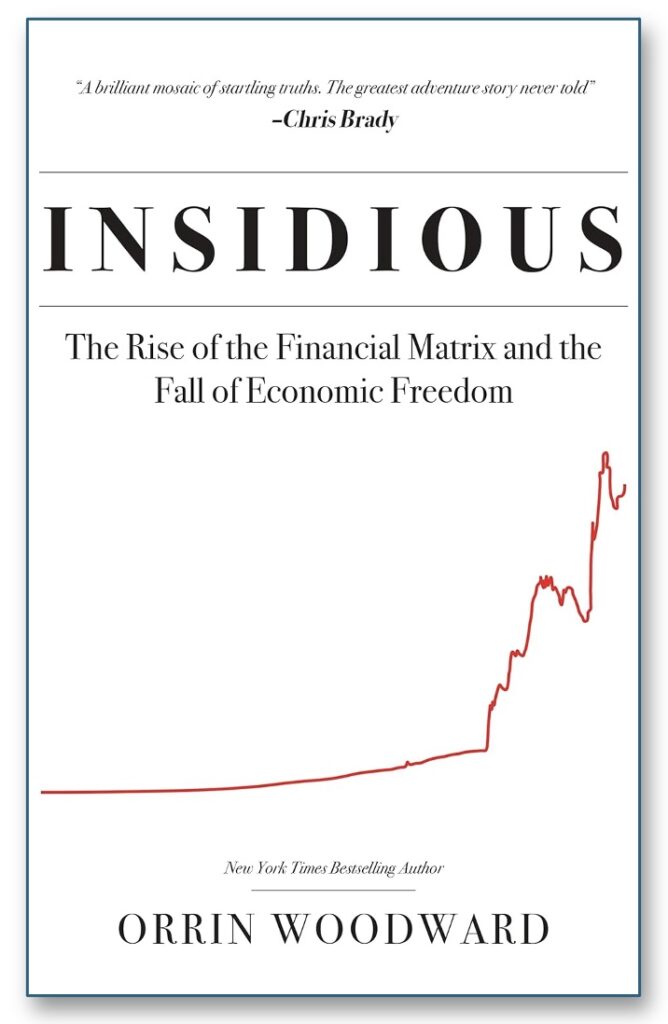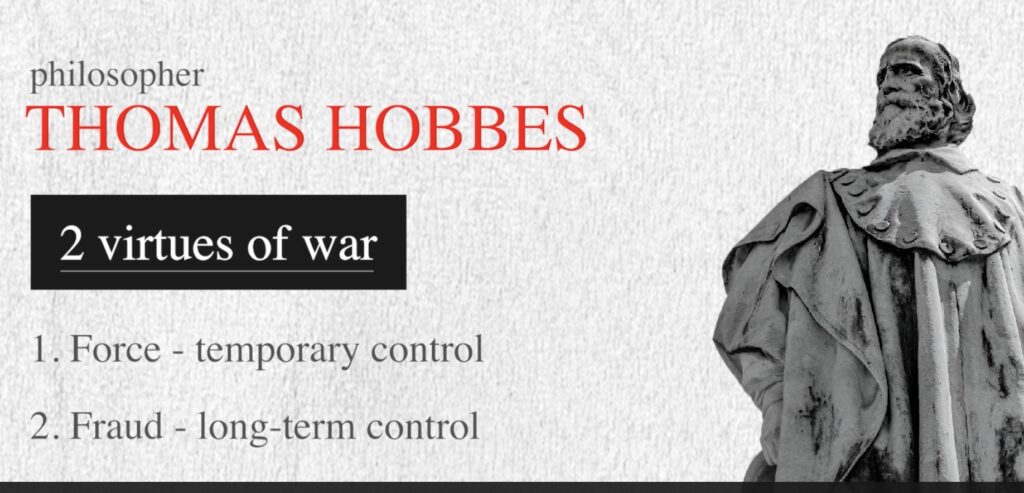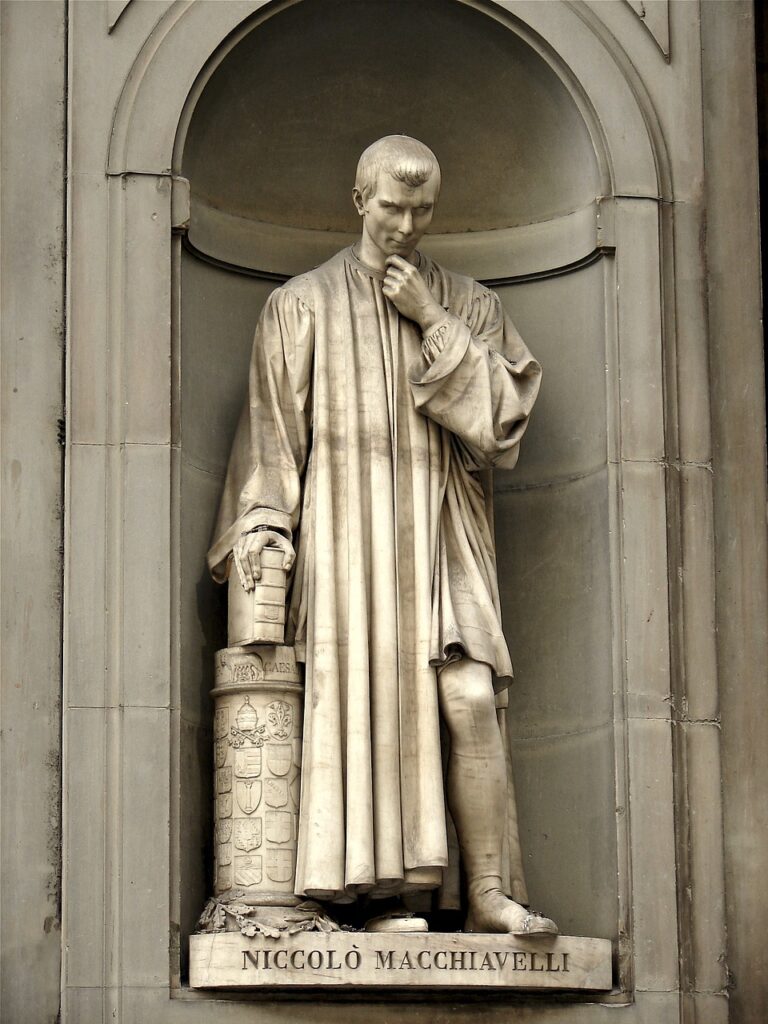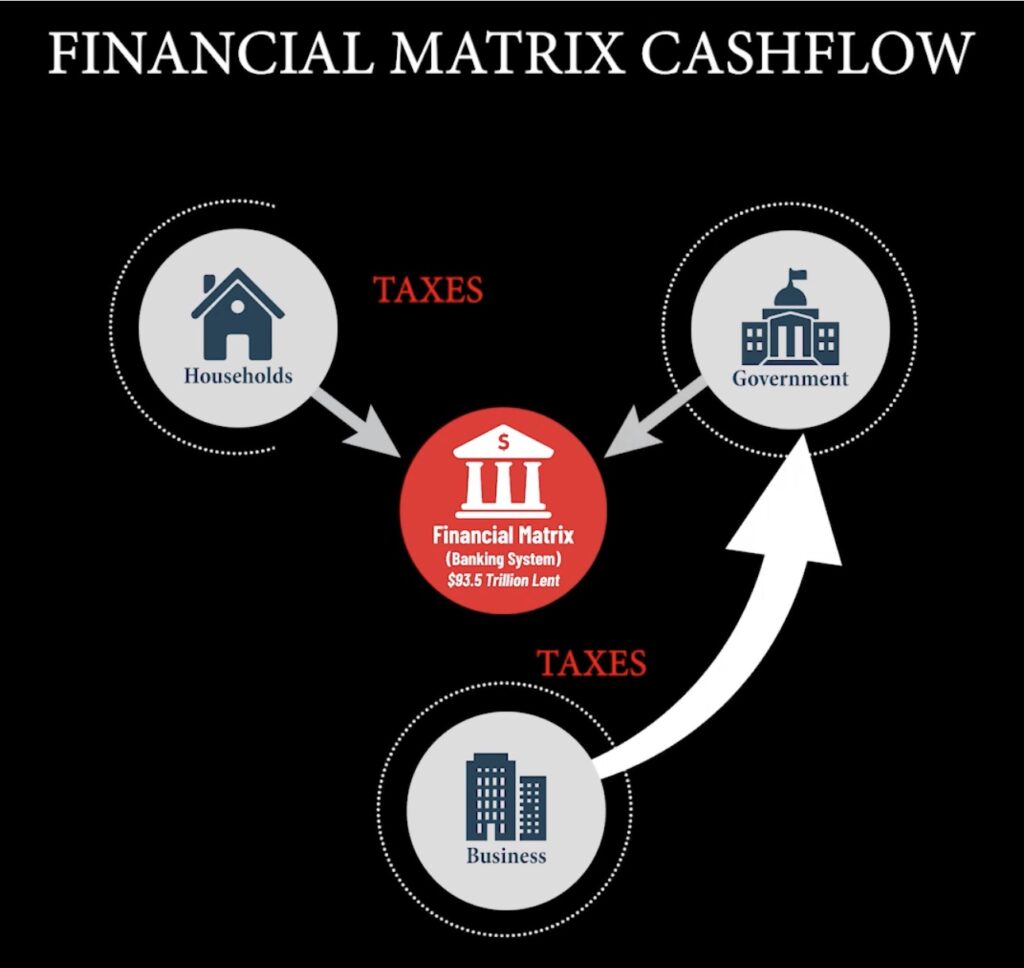 THE BEST BOOK OF THE YEAR
THE BEST BOOK OF THE YEAR
Why Everyone Who Cares About Freedom Should Immediately Read This Book
by Oliver DeMille
I almost hesitate to give you my raw impressions of this book lest you think I resort to hyperbole. Let me assure you: I do not. See the details of my review below for specifics on why I give it such glowing praise!
I recently finished reading the new book Insidious, by Orrin Woodward, and it is fantastic. It is definitely a new classic. In fact, it is now the new standard on books about money and economics, an upgrade from Aristotle, Palyi, Hulsmann, Cantillon, Sumner, Fisher, Mises, Paul, Lewis, and even Rothbard. I think this should be a core book in every school and college, and on the shelf of every home.
I’m not kidding. This book is firmly in its element sitting together with the great classics of freedom. At the risk of going too deeply into the book in a review, but knowing that those who read my articles tend to really appreciate great and deep books, I have to tell you more about this new modern classic.
 I especially liked the following items:
I especially liked the following items:
- The way Woodward differentiated State Power money and Financial Power money is brilliant. It’s one of those things that is obvious when one reads his commentary on it in the book, but that nobody has ever before articulated as clearly or directly as the way he explains it. Any reader can understand it, any adult, and your youth as well. And they’ll know more about current-event economics and what’s really going on in Washington D.C. and world markets by reading this book than by studying any other book I can think of. It’s that good, and that important.
- The way he juxtaposes the above (State Power money vs. Financial Power money) with the classical freedom definitions of the Government vs. the State is highly effective. And showing who wins…and who doesn’t…reinforces his point unforgettably. Comparing these two models together puts both of them in a much more understandable light. Nobody who reads this section will ever see government, politics or economics in the same way. And the diagrams and charts greatly strengthen his arguments and make them easy to understand and share with others.

- The analogy of “Fractional Reserve BOATING” is fantastic. It quickly and permanently exposes the entire current Money/Banking system for exactly what it really is–and isn’t. This is potentially as powerful as when Adam Smith coined the phrase “Diamond-Water Paradox”. If you don’t know what this means, all the more reason to read this book. It’s a game changer.
- Now, this next point I’m going to share changes the world, and should cause the rewriting of every important Economics textbook and cause the adding of an endnote to every Political Economy classic. I’m referring to the way Woodward takes on the ancient and medieval understanding of usury, and clarifies what the real negative is, not the traditional “charging of interest” view but rather the secretive (at least to the masses) implementation of fractional reserve banking. Woodward’s explanation is crystal clear and easy to understand, even for this traditionally-very-difficult-to-grasp concept. It was this topic that led Lenin and Keynes to say that not one man in a million would see what is happening when those in power use money to destroy their freedoms.
After reading Woodward’s book, every reader will see it clearly—every time those in power try it, or even propose it. In fact, if this section were the only thing in this book, it would still be the most important book on economics written so far this century. One thing is certain: This section of the book is gold. Nobody is truly educated who doesn’t understand how this works, and all readers of this book will quickly and fully understand it.
 This book is also a major addition to the modern economics-and-freedom dialogue. We need it in our society right now, especially in this post-election era where half the nation feels that freedom won and that they can now rest and let the newly elected leaders run everything, while the other half feels like they lost a lot in the election and need to find ways to fight behind the scenes for more power in our government.
This book is also a major addition to the modern economics-and-freedom dialogue. We need it in our society right now, especially in this post-election era where half the nation feels that freedom won and that they can now rest and let the newly elected leaders run everything, while the other half feels like they lost a lot in the election and need to find ways to fight behind the scenes for more power in our government.
The truth is, freedom is always under attack, and after big-change elections it is always under more attack than usual. Today’s citizens who love freedom need to read and understand the specific material in this book. And we need it now, and for the months and four years ahead. The battle for freedom isn’t over, it’s just getting started, and those who are against freedom are quietly building behind the scenes even as you read this. It matters, right now. As Ronald Reagan put it, we are always just one generation away from losing our freedoms. We need this book.
+On the fun side, Woodward has amassed a fabulous collection of the best-of-the-best on economic freedom quotes and a lot on politics and history as well. If you just thumb through my copy of the book and notice only the quotes I’ve circled in pen, it would be like reading an Oxford- or Cambridge-style Collection of the Best Quotes on freedom and free enterprise. Very fun to read just for the huge diversity of great thinkers cited, and especially for the great ideas they share.
+For example, the book begins with a quote by Thomas Hobbes: “Force and fraud are the two cardinal virtues in war.”

Source: https://www.insidiousbook.com/video-series/chapter-1
Think about how profound that truth is. Woodward develops this idea in detail, showing numerous ways in which fraud is committed by governments with money, with elites making economic war on the regular, hard-working citizens. It is a total paradigm shift for anyone who has studied economics and politics the modern ways–either in academia or from the media. And the way Woodward builds on this theme throughout the book, with various examples and comparisons, keeps it always in the reader’s mind.
+Another example of the great quotes he compiled is one in his own words: “Alas, every fraud must have its facade.” And the explanations and examples he uses to portray how the Establishment works—regardless of who is in power–peels back so much of what government and media do each month and year.
+On an even deeper level, for those who have studied a lot about economics, Woodward’s hypothesis that a certain type of banking we all take for granted today is the underlying cause of the business cycle and all its woes, is another revolutionary and innovative contribution of this book–and like those listed above it is both novel in the way it is described and yet so clearly and obviously accurate to anyone who goes on to read his evidence and commentary. And then he outlines the simple solution—so clear and elegant that it will knock your socks off. This book is scholarly as well as enjoyable to read, and the conclusions are accurately supported and impeccably cited. Obviously some people won’t bother looking up all the many pages of endnotes and studying them in detail, but if you’re like me this will be a bonus highlight of studying this book.
+Again, I am convinced that Woodward has penned the best economic text of the century to date. Here are a few examples of quotes and further evidence of how deep and yet clear this great new book actually is:

—“…all inflation is not created equal…”
—“…fractional-reserve banking creates more total debt than it does debt-money…”
—“Fractional reserve banking money supply accounts for entrepreneurs’ cluster of errors.”
—“Historically, there have only been three approaches to money and banking: 1) Free Markets, 2) Financial Power, or 3) State Power.”
—“Power is addictive, but it never satisfies.”
And he explains each of these so well. Moreover, there are so many more great quotes like these. One example: at the end of the book a profound Benjamin Franklin quote from 1763 brings it all together–reasons, results, and reality. Real answers. I love that Woodward used this Founding-era wise example of fixing our economic system the right way; instead of giving just examples of mistakes made by past leaders, he shows examples of successes, of implementing the right kind of economic policies. This very effectively shows the true consequences of all the wrong ways. Fabulous writing strategy–masterful.
 +This book should be required reading for every American, not just in economics courses but in history classes, social studies and political science. It should be read by every American youth, adult, leader, scholar and expert. The mostly hidden history Woodward chronicles about money at the root of American governance and freedom is even more important than the sadly ignored Case Law history of the United States shared by Forrest McDonald or the largely unknown direct impact of religion on American government as taught by John Eidsmoe. Or the little understood power of certain great books (including Plato, the Bible, and several others) on America’s history as described in Allan Bloom’s The Closing of the American Mind. The money history is largely unknown, yet Woodward has laid it bare and made it very easy to grasp in this tour de force. Brief, deep and crucially important knowledge. It makes me immediately and repeatedly think of Hosea 4:6—“My people are destroyed for lack of knowledge…”
+This book should be required reading for every American, not just in economics courses but in history classes, social studies and political science. It should be read by every American youth, adult, leader, scholar and expert. The mostly hidden history Woodward chronicles about money at the root of American governance and freedom is even more important than the sadly ignored Case Law history of the United States shared by Forrest McDonald or the largely unknown direct impact of religion on American government as taught by John Eidsmoe. Or the little understood power of certain great books (including Plato, the Bible, and several others) on America’s history as described in Allan Bloom’s The Closing of the American Mind. The money history is largely unknown, yet Woodward has laid it bare and made it very easy to grasp in this tour de force. Brief, deep and crucially important knowledge. It makes me immediately and repeatedly think of Hosea 4:6—“My people are destroyed for lack of knowledge…”
This book is an antidote to just such a lack, and the resulting destruction.
So real.
So current, and so relevant.
 +Going even deeper, Woodward’s development of the huge 1971 money/economics shift in Washington D.C. and how it impacted so many areas of every person’s life is extremely effective. Charts, graphs, stats, examples and comments help make this easy to understand and remember. Like the Hobbes quote I mentioned above, the 1971 shift is a thread that weaves through the book, reinforced a number of times, and it will be very hard for readers to ever forget. This will make them a higher level of citizen, voter and potential leader.
+Going even deeper, Woodward’s development of the huge 1971 money/economics shift in Washington D.C. and how it impacted so many areas of every person’s life is extremely effective. Charts, graphs, stats, examples and comments help make this easy to understand and remember. Like the Hobbes quote I mentioned above, the 1971 shift is a thread that weaves through the book, reinforced a number of times, and it will be very hard for readers to ever forget. This will make them a higher level of citizen, voter and potential leader.
+Woodward goes on to share the current relevance of quotes by Machiavelli, leaders in the Bretton Woods agreement, Walter Lippman, Sennholz, Ron Paul, and so many others.
In one place, speaking of the American power Establishment, he mentions “False Hegelian thesis and antithesis constructs…” –I didn’t know whether to laugh or cry when I read this phrase. Both laughing and crying are appropriate. I think using this phrase was Woodward giving a nod, and in fact a call out, to any economic/political experts who read the book, and those words (“false Hegelian thesis and antithesis constructs”) would very likely have been the title of this book had it been written as a thesis or dissertation. Thank goodness it wasn’t, though, because it needs to be read and re-read by more than 6 people. But the references will be understood by the most learned and adroit experts; Woodward really outdid himself, leaving no audience uninvited to the discussion, from top expert to political-economics rookie. It’s rare to do this well, because effectively teaching all the levels of readers at once isn’t easy, but Woodward has done it. Again, this book speaks to readers from all backgrounds, and from novices to specialists.
+Perhaps Woodward’s most profound point of all, especially to readers right now in 2024 and 2025, is that elections won’t fully fix a broken system, and just “throwing the bums out”, or getting rid of the “evil people” in government, as Solzhenitsyn called them, the bad apples, won’t truly solve things as long as the money-economic system quietly keeps corrupting.

Source: https://www.insidiousbook.com/video-series/chapter-1
Woodward wrote: “…if the Financial Matrix system rewards the evil within human hearts, we should not be surprised that there is a steady stream of people willing to partner with it.” This message in a nutshell sums up the current problem and the solution–the system must change, and thus it must be truly understood. And to change it, he argues, simply treat the cheating like cheating [in certain legal but hidden and destructive types of banking], and outlaw it. On this point, Bastiat, Mises and Rothbard are well quoted in this commentary. The answers are clear, but we must know them in order to implement them.
There are a number of other things I could mention, but these are the key principles, explanations and solutions that really floored me as I read. This book is a magnum opus, not just for Woodward, but for 21st Century Economics. It’s literally the best book I’ve ever read on the topic. I loved studying it closely.
If you care about freedom, read this book.
If you know someone who cares about freedom, introduce them to this book.
It’s a game-changer. Because knowledge is power. And the truth shall set you free. This book fulfills all these promises. Just be prepared to exclaim “Eureka!” repeatedly as you read.
Moreover, it is extremely fun. Reading it was a delight!









Best economic study and analysis of how we got here I’ve ever seen. Clear and concise and entirely relevant to todays society. Highly recommended reading!
Oliver, what an amazing book review! I love this book and have studied it quite a bit but reading your review makes me appreciate it at a whole new level! It’s like touring a fine art museum with one of the great masters as my tour guide.
Couldn’t agree more, although I’m not not smart enough or studied enough to be as strong and knowledgeable about why I do agree. I just know that it helped me to get to a place in my mind where the facts of the matter echoed more clearly the feelings of my soul.